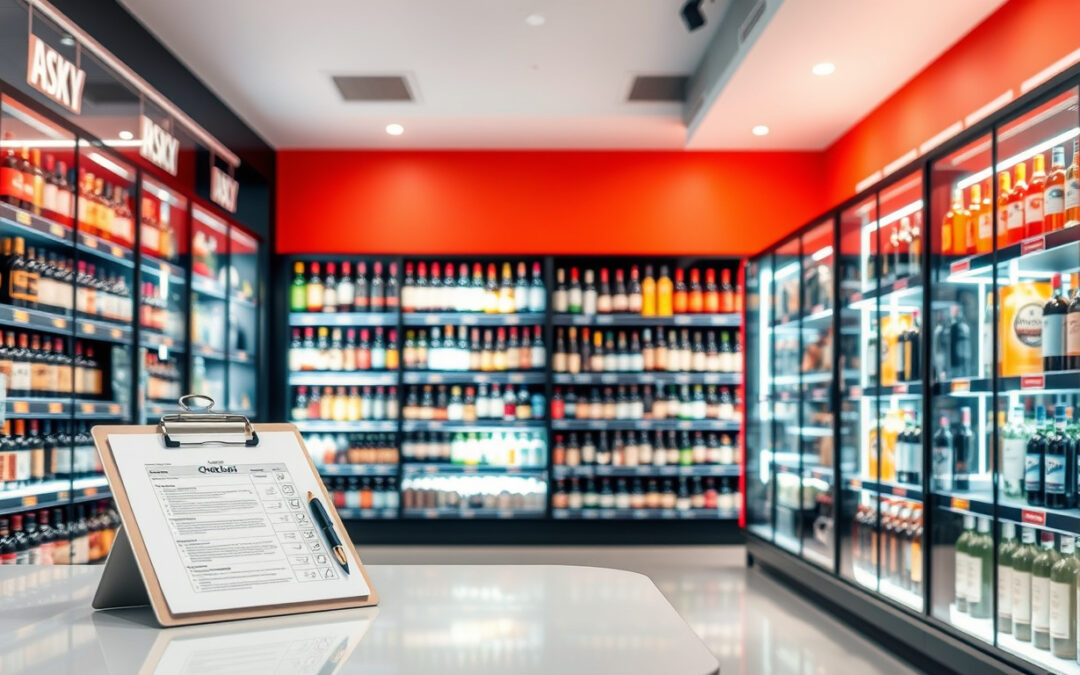Maintaining alcohol vendor compliance is crucial for every business that sells or distributes alcohol. Laws must be followed. Failing these rules brings fines, lost licenses, or permanent closure. Knowing the rules helps your business act legally. It offers safe service and protects your good name.
In this article, we show clear ways to stay legal as an alcohol vendor. We cover licenses, staff training, and record keeping.
Understanding Alcohol Vendor Compliance
Alcohol vendor compliance means following federal, state, and local laws that control how alcohol is sold or promoted. These laws tell who may sell alcohol, who may buy it, and how sales occur. Compliance is not only law; it also builds public safety and trust.
Key rules are:
- Get and keep the needed licenses.
- Check ages and use safe sales rules.
- Follow the allowed hours of sale.
- Keep clear records.
Missing these steps can start legal trouble. Vendors must know every rule.
Essential Licensing Requirements for Alcohol Vendors
Getting the right licenses is the first step. Licenses depend on the drink type (beer, wine, spirits), the type of business (store, bar, restaurant), and the area.
Types of Alcohol Licenses
- Retail Beverage License: For stores selling alcohol for off-premise use.
- On-Premise License: For bars, restaurants, and clubs serving drinks on site.
- Wholesaler License: For distributors supplying alcohol to stores.
- Special Event Permits: Temporary licenses for events serving drinks.
Talk with your local Alcohol Beverage Control (ABC) agency or similar body to learn which license you need. Each license has its own rules and renewal dates. Stay up to date.
Implementing Robust Age Verification Processes
The most important rule in alcohol vendor compliance is to stop sales to minors. This rule stops illegal drinking and protects your business from fines.
Tips for Effective Age Verification
- Check Government-Issued IDs: Ask for a driver’s license or passport.
- Train Employees Thoroughly: Teach staff to spot real IDs and detect fakes.
- Use Technology: Use electronic scanners to check age right away.
- Follow Age Rules Strictly: In the U.S., no one under 21 may buy alcohol.
Always enforce age checks. A strict policy shows zero tolerance for underage sales.
Staff Training and Responsible Beverage Service
Well-trained staff help you follow alcohol rules. Good training supports responsible service and helps staff manage tough situations like serving intoxicated customers.
Components of Staff Training
- Learn which laws matter and the penalties for breaking them.
- Practice saying no to service, nicely but firmly.
- See clear signs of intoxication.
- Handle difficult customers safely and legally.
- Keep clear records of events.
Many states require training programs that come with certificates. Regular training keeps your team updated on law changes and best ways to serve.
Record-Keeping and Documentation
Good record keeping is a legal must and useful for audits and reviews.
Essential Records Include:
- Copies of licenses and permits.
- Certificates of employee training.
- Logs of sales and refusals.
- Reports of incidents with alcohol.
- Records of inventory and orders.
Accurate documentation proves your compliance and helps when problems or audits arise.
Adhering to Time and Location Restrictions
Most places restrict when and where alcohol can be sold. These rules help keep the peace and stop overdrinking.
Common Restrictions Are:
- No sales at certain hours (for example, after midnight).
- No sales in restricted zones (dry zones).
- Rules for a safe distance from schools or churches.
Check your local laws and post signs so everyone knows the limits.
Using Technology to Enhance Alcohol Vendor Compliance
New technology helps vendors meet the rules quickly and accurately.
Useful Technologies Include:
- Point of Sale (POS) Systems: They can check age and manage reports.
- ID Scanning Devices: They help stop fake IDs.
- Inventory Management Software: They track stock and sales details.
- Compliance Management Platforms: They alert you about licenses and training deadlines.
Technology cuts human error and makes inspections easier.
Creating a Culture of Compliance
Systems and rules are key, but a company culture that values compliance makes a big difference.
How to Build This Culture:
- Let management show the way.
- Reward employees who act responsibly.
- Share regular updates on the rules.
- Encourage staff to report issues safely.
When everyone understands compliance, your business and community stay safe.

Checklist: Strategies for Effective Alcohol Vendor Compliance
Here is a simple checklist for compliance:
- Get and renew all needed licenses and permits.
- Set up a firm and checkable age verification process.
- Provide regular staff training on responsible service.
- Keep organized records and documents.
- Follow local laws on sales times and restricted zones.
- Use technology to aid compliance.
- Create a work culture that values legal safety.
These steps lower risks, improve your work reputation, and help your business follow the law.
Frequently Asked Questions About Alcohol Vendor Compliance
1. What is the importance of alcohol vendor compliance?
Compliance means a business sells alcohol in line with all laws. It keeps people safe by stopping underage and unsafe sales. It also helps vendors avoid fines and license loss.
2. How can an alcohol vendor verify the age of customers effectively?
Ask for government-issued IDs. Train staff to spot fakes. Electronic ID scanners add extra safety, reducing human error.
3. What are the consequences of non-compliance for alcohol vendors?
Breaking the rules can bring heavy fines, lost licenses, criminal charges, and a damaged reputation. Repeated rule-breaking might end in closure.
Conclusion
Keeping alcohol vendor compliance needs work, clear rules, and good management. By getting the right licenses, checking ages, training staff, keeping careful records, and using technology, vendors can handle the many rules.
Following alcohol laws protects your business and supports responsible drinking in your community. For more details, contact your local Alcohol Beverage Control agency or visit the U.S. Alcohol and Tobacco Tax and Trade Bureau website. Staying informed will keep your alcohol service safe, legal, and successful.


